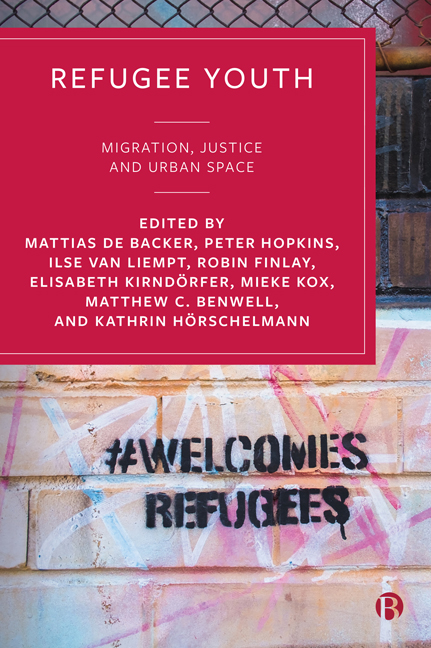Book contents
- Frontmatter
- Contents
- List of Figures and Tables
- Notes on Contributors
- Acknowledgements
- 1 Introducing Refugee Youth: Migration, Justice and Urban Space
- 2 Storying Belonging, Enacting Citizenship? (Dis)articulations of Belonging in a Community Theatre Project with Young Refugees and Asylum Seekers in Leipzig, Germany
- 3 Jackets and Jewellery: Racialised Dispossession and Struggles over Public Space in Denmark
- 4 Venezuelan Refugee Youth and Brazilian Schooling: The Individual between Languages and Spaces
- 5 The Inclusionary Potential and Spatial Boundaries of (Semi-)Public Space: Refugee Youth’s Everyday Experiences in the Urban Fabric of Amsterdam
- 6 Navigating ‘Purdah’ Culture in Urban Space: The Restricted Lives of Young Married Rohingya Refugees in Malaysia
- 7 Inclusive Urban Planning and Public Space for Refugee Youth in Pursuit of a Just City in Amman, Jordan
- 8 Sense of Belonging among Tibetan Refugees in India: A Case Study of the Bylakuppe Settlement in Karnataka, India
- 9 Negotiating Identity in Urban Space: Everyday Geographies of Syrian Students in Istanbul
- 10 ‘You’re Judged a Lot’: Australian Sudanese and South Sudanese Youths’ Perspectives on Their Experiences in Public Spaces
- 11 Hair Salons as ‘Private-Public Spaces’: Exploring the Experiences of Young Migrant Women in an Urban Township in South Africa
- 12 Emotion and Spatial Belonging: Exploring Young Migrant Men’s Emotional Geographies in Cork, Ireland
- 13 Homemaking through Music in Urban Africa: Creating Opportunities as a Refugee and a Migrant in Kinshasa and Dar es Salaam
- 14 Planetary Listening
- 15 Refugee Youth: Politics, Publicness and Visibility
- Index
6 - Navigating ‘Purdah’ Culture in Urban Space: The Restricted Lives of Young Married Rohingya Refugees in Malaysia
Published online by Cambridge University Press: 18 January 2024
- Frontmatter
- Contents
- List of Figures and Tables
- Notes on Contributors
- Acknowledgements
- 1 Introducing Refugee Youth: Migration, Justice and Urban Space
- 2 Storying Belonging, Enacting Citizenship? (Dis)articulations of Belonging in a Community Theatre Project with Young Refugees and Asylum Seekers in Leipzig, Germany
- 3 Jackets and Jewellery: Racialised Dispossession and Struggles over Public Space in Denmark
- 4 Venezuelan Refugee Youth and Brazilian Schooling: The Individual between Languages and Spaces
- 5 The Inclusionary Potential and Spatial Boundaries of (Semi-)Public Space: Refugee Youth’s Everyday Experiences in the Urban Fabric of Amsterdam
- 6 Navigating ‘Purdah’ Culture in Urban Space: The Restricted Lives of Young Married Rohingya Refugees in Malaysia
- 7 Inclusive Urban Planning and Public Space for Refugee Youth in Pursuit of a Just City in Amman, Jordan
- 8 Sense of Belonging among Tibetan Refugees in India: A Case Study of the Bylakuppe Settlement in Karnataka, India
- 9 Negotiating Identity in Urban Space: Everyday Geographies of Syrian Students in Istanbul
- 10 ‘You’re Judged a Lot’: Australian Sudanese and South Sudanese Youths’ Perspectives on Their Experiences in Public Spaces
- 11 Hair Salons as ‘Private-Public Spaces’: Exploring the Experiences of Young Migrant Women in an Urban Township in South Africa
- 12 Emotion and Spatial Belonging: Exploring Young Migrant Men’s Emotional Geographies in Cork, Ireland
- 13 Homemaking through Music in Urban Africa: Creating Opportunities as a Refugee and a Migrant in Kinshasa and Dar es Salaam
- 14 Planetary Listening
- 15 Refugee Youth: Politics, Publicness and Visibility
- Index
Summary
Introduction
Asylum seekers and refugees in Malaysia are usually urban residents, living in urban areas as opposed to designated refugee camps (Nungsari et al, 2020) as there is no such place provided by the government. Over the last three decades, many Rohingyan refugees have settled in the suburbs of Kuala Lumpur (Huennekes, 2018), particularly in shared low-cost flats and affordable houses, becoming a close-knit community. Urban areas were chosen as a place of residence due to the availability of work, particularly in the informal economy sector; this also enabled the mobility of refugees, accessibility to community-based activities, and proximity to international agencies and local non-governmental organisation (NGO) offices. However, the purdah culture, a social norm adhered to strongly by many Rohingya, has impacted their lived experience in urban settings, particularly among vulnerable young refugees. Many aspects of Rohingya refugees’ lives are restricted, including schooling, employment and access to medical services as they adhere to their culture uncompromisingly.
Previous research on Rohingya refugees living in long-term or shortterm settlements focused heavily on legal rights, personal challenges and struggles faced in their host countries. While several studies also discussed purdah culture as a barrier to refugees’ access to healthcare (Ripoll, 2018; Parmar et al, 2019; Guglielmi et al, 2021), gaps remain in relation to how young married refugees survive in urban areas and obtain work, education and healthcare in a new host country. As Rohingya refugees tend to adhere to purdah culture, especially newly arrived refugees, it is important to understand how this practice impacts their lives.
In this chapter, we explore how young married Rohingya refugees navigate the purdah culture in urban Malaysia. The lives of migrants are in limbo, including in Malaysia, due to the slow progress of judicial hearings or state bureaucratic processes regarding their legal status and resettlement (Mountz et al, 2002). As Griffiths (2014) notes, asylum seekers wait for long periods for a decision, and many live in constant fear of sudden changes and are uncertain of when they will hear the outcome of their application for refugee status. In this period of ‘waiting’, some Muslim refugees seek to marry a person who shares their language and culture, or reunification with family, which challenges their integration into the host country (Brunner et al, 2014).
- Type
- Chapter
- Information
- Refugee YouthMigration, Justice and Urban Space, pp. 81 - 99Publisher: Bristol University PressPrint publication year: 2023



